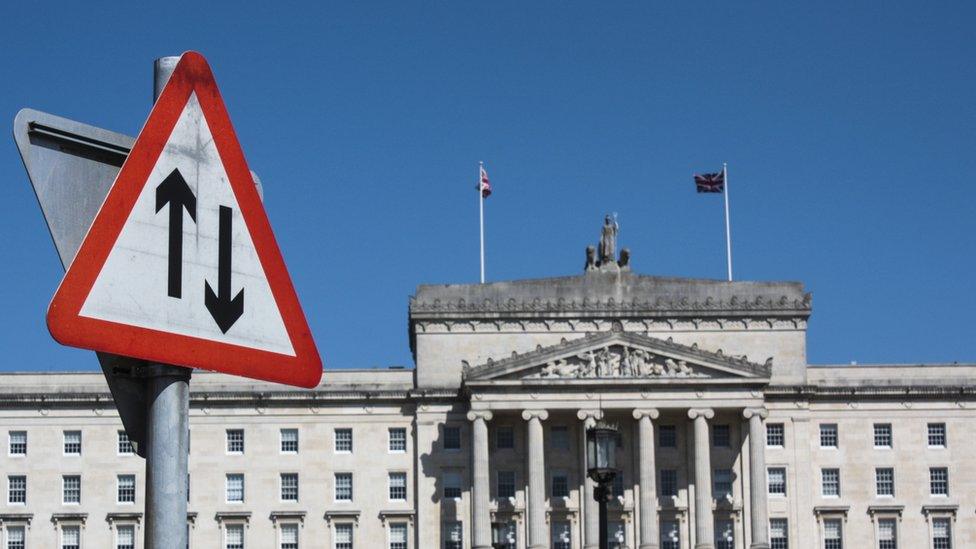Prime Minister Rishi Sunak meets Stormont parties on first NI visit
- Published
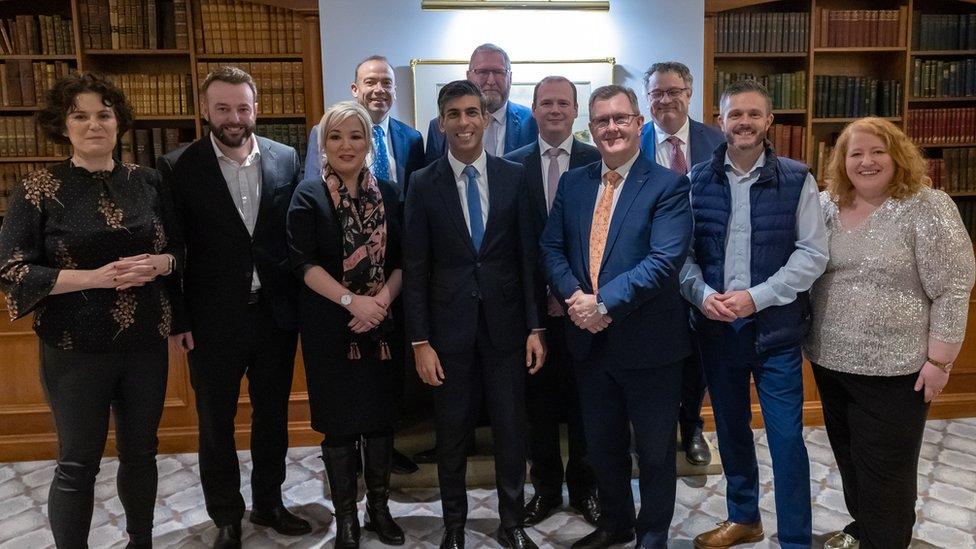
Rishi Sunak met politicians from the five main Stormont parties on Thursday night
Rishi Sunak has met the leaders of Stormont's five main political parties as part of his first visit to Northern Ireland as prime minister.
Political leaders said their meetings with Mr Sunak focused on restoring power-sharing, the stalled energy payment scheme and the nurses strike.
DUP leader Sir Jeffrey Donaldson said Mr Sunak indicated that NI Protocol talks were likely to intensify.
Sinn Féin's Michelle O'Neill said the meeting was a "useful exchange."
However, she also urged the prime minister to work "at pace" to resolve outstanding issues.
Earlier, the Northern Ireland secretary Chis Heaton-Harris held round-table talks with the party leaders on efforts to restore power-sharing.
It came on what would otherwise have been the date for a snap election, but it was delayed into next year.
Last week, legislation took effect making 19 January the new deadline for reforming an executive.
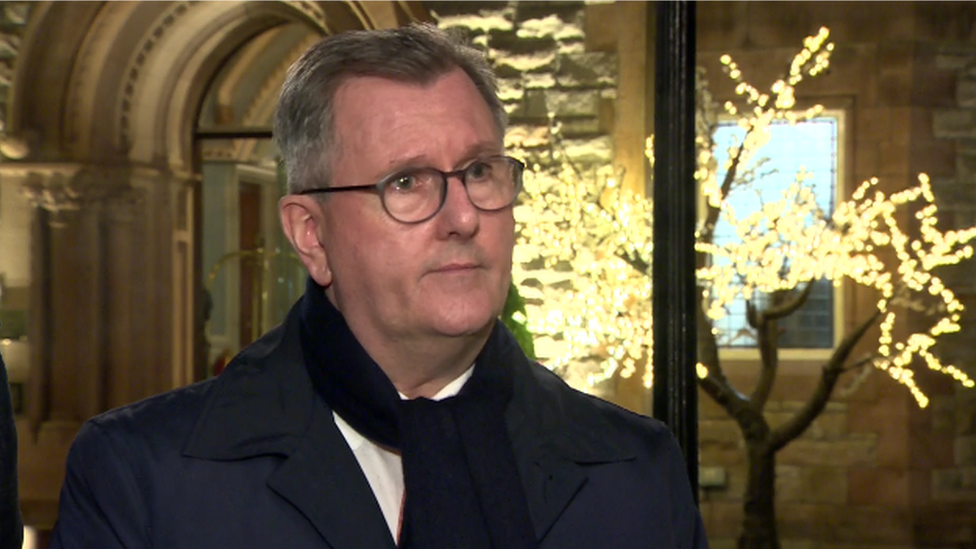
DUP leader Sir Jeffrey Donaldson said the prime minister indicated talks with the EU over the protocol will intensify
Northern Ireland has been without a fully-functioning government since February, when the DUP walked out of the executive in protest over the Northern Ireland Protocol.
Unionists argue the post-Brexit trading arrangement undermines Northern Ireland's position in the UK, as it keeps the nation aligned with some EU trade rules to ensure goods can move freely across the Irish land border.
There have been five failed attempts to restore the executive since the last assembly election in May, when Sinn Féin won the largest number of seats for the first time.
The DUP has repeatedly refused to vote for a new speaker - a position that must be filled before any other business can be heard and maintains that it has a mandate from voters not to return to power-sharing until the protocol is changed significantly.
Earlier, Mr Heaton-Harris said he remained of the view that there was no reason for the DUP to stay out of the executive.
What did the parties say after PM meetings?
Speaking after meeting the prime minister, DUP leader Sir Jeffrey Donaldson said the prime minister indicated talks with the EU around the Northern Ireland Protocol.
He said there needed to be flexibility on the EU side as there was currently no space for a deal to be struck "given the limitations of their negotiating mandate".
Sir Jeffrey said it was likely these negotiations would run to early February and it was not a question of how long it took but about getting it right.
Sinn Féin's deputy leader Michelle O'Neill said "more than warm words and good mood music" was needed to find an agreed way forward on resolving the protocol and restoring power-sharing.
"We have been here for far too long in this space without an executive, so I made the case to him directly this needs to be done speedily, they need to be directly involved in the conversations and to get an agreed way forward and to get it now," she added.
Ms O'Neill also questioned Mr Sunak on delivering the delayed £600 energy payment and public sector pay for striking nurses.


Downing Street described Thursday's meeting as an informal gathering, an opportunity to make introductions - not a hard political negotiation, but more about starting to build relationships.
So expectations were pretty low going in.
When political leaders emerged they said the conversation was warm and cordial but with frank exchanges.
The prime minister was said to be in listening mode, and he listened to the many challenges facing Northern Ireland - the stalled £600 energy payment, the protocol and the nurses strike, which was uppermost in the minds of many of the politicians who gathered this evening.
But there is, it has to be said, a sense of optimism from the leaders that we're moving in the right direction in terms of the protocol.

Alliance leader Naomi Long said the prime minister's visit was important, and that he spoke "openly and candidly" with Stormont politicians.
But, she added, the government needs to "step up" to ensure the protocol issue is dealt with.
"We don't want a deal that will cause further problems down the line," Ms Long said.
"They've got one more shot at this and they've got to get it right."
SDLP leader Colum Eastwood said he raised issues around workers pay and the collapse of power-sharing at Stormont.
He said talks around the protocol were going quite well and that he believes it will be resolved, but there are lessons to be learned.
"We can't keep playing fast and loose with democracy and power-sharing because someday it won't be there," he said.
"What we are looking for is action."
Why is the PM in Northern Ireland?
The two-day trip is being described by Downing Street as marking the return of naval shipbuilding to Belfast.
A consortium, including Belfast's Harland and Wolff, was chosen for a £1.6bn Ministry of Defence contract to build three new Royal Navy support ships.
In a statement, Downing Street said Mr Sunak will highlight the UK-wide nature of the naval project and demonstrate how Northern Ireland's economy is intertwined with the rest of the UK.
"Northern Ireland - its people and its future - are rightly at the centre of our shipbuilding ambitions," the prime minister said.
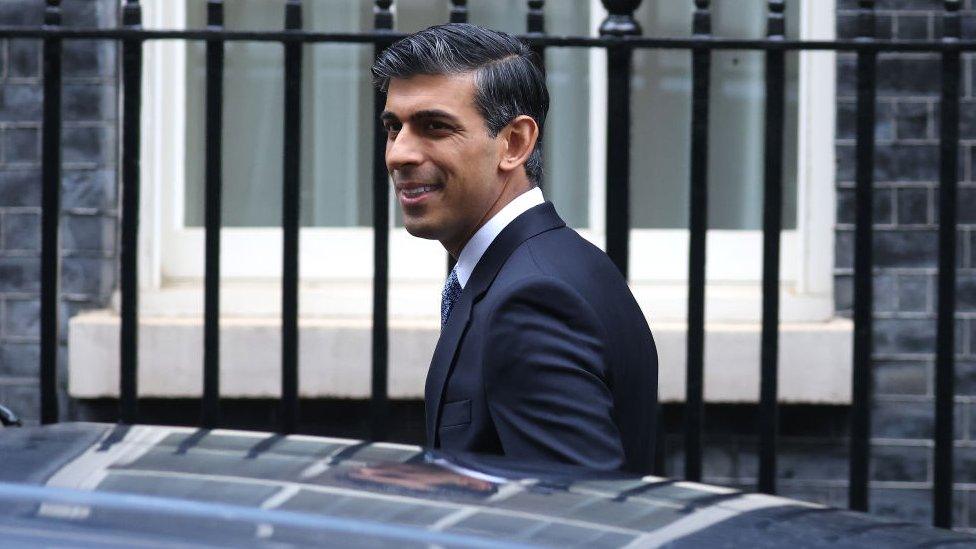
Rishi Sunak is currently in Northern Ireland for a two-day trip
"The thousands of high value jobs and the skills that are gained from delivering it now will help to lay the foundations of prosperity for tomorrow."
Earlier, UK Foreign Secretary James Cleverly met EU Commission vice-president Maroš Šefčovič in Brussels.
Talks have been happening at a technical level for some months, but a resolution does not appear imminent.
Teams on both sides have said a window of opportunity exists to agree a deal but have not specified a timetable.
Related topics
- Published19 January 2023
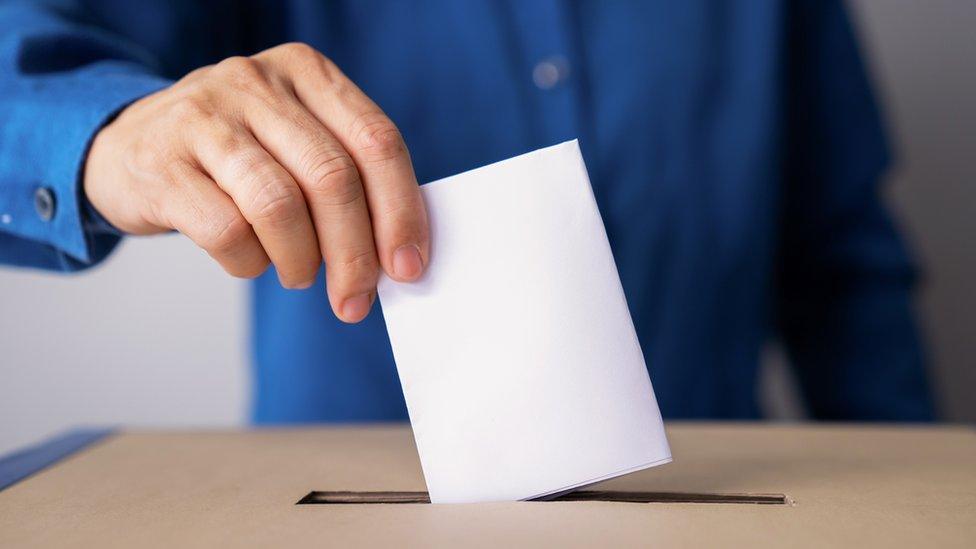
- Published8 December 2022
